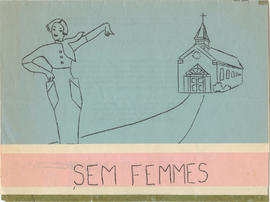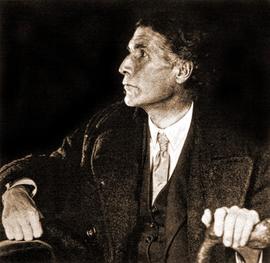The Seminette Club (1954-1970) was for the wives, and intended wives, of students at the Evangelical Lutheran Seminary of Canada, and Waterloo College (now Wilfrid Laurier University) in Waterloo, Ontario. The purpose of the club was fellowship, study, and discussion in preparation for the role of a pastor's wife.
Wilfrid Laurier University Women's Association (1960-1993) was a social group for female faculty and administrators as well as the wives of faculty members of Waterloo Lutheran University (now Wilfrid Laurier University) in Waterloo, Ontario. Its purpose was to welcome new members, develop social events and foster member participation in University and community affairs. The group was established under the name of Faculty Wives, which was changed to Waterloo Lutheran University Women's Association, and later to the Wilfrid Laurier University Women's Association.
The Faculty of Science at Wilfrid Laurier University was founded in 2000, when the Faculty of Arts and Sciences partitioned into distinct faculties of Arts and Science. The Faculty consists of the Departments of Biology, Chemistry, Kinesiology and Physical Education, Mathematics, Physics and Computer Science, Psychology and the Health Sciences program. Deans of the Faculty of Science have been Dr. Arthur Szabo (2000-2007), Dr. Deb MacLatchy (2007-2009), and Dr. Paul Jessop (2009- present).
The Faculty is predominantly housed in the Science Building which was officially opened in 1995. Eventually the Science Research Centre (opened in 2004) was added between the Science and Bricker Academic Buildings. The Research Centre is a dedicated research building for faculty and students.
In 2000, the Faculty of Science mandate was as follows:
“Laurier’s Faculty of Science is dedicated to collaboration between and beyond its six departments. In that spirit, the Faculty offers selected high quality programs with homes in Biology, Chemistry, Kinesiology & Physical Education, Mathematics, Physics and Computer Science and Psychology. Its programs are contemporary and competitive, designed to attract the highest quality students, and to provide them with a stimulating education and thorough preparation for employment or further studies. That Faculty holds the advance of scientific knowledge as one of its key values, and as such is committed to sustaining a supportive climate for research in the pure, social and applied sciences. The Faculty’s spirit of shared enterprise is highly valued by its members.”
The Waterloo Lutheran University Graduate School of Social Work was founded in 1966 with a curriculum based on clinical practice as well as community organization practice. Students specialized in one of five concentrations: community development, social planning, social administration, research, or individuals, families and social groups. The first class graduated in 1968, the same year that the Graduate School of Social Work was accredited by the Council on Social Work Education. In 1974, the name of the program was changed to the Faculty of Social Work to reflect the expansion into part-time, continuing education and undergraduate social welfare courses (offered in the Faculty of Arts and Science). In 1981, the Faculty of Social Work created an undergraduate Social Welfare Option, considered to be a minor.
The Doctor of Social Work program was established in 1987, making it the first doctoral program at Wilfrid Laurier University.
By 1988 the Faculty had moved from the seminary to the Peters building and then to the Aird building before moving to the St. Jerome’s Duke Street building in 2006. This Laurier Kitchener campus was a 12 million dollar conversion from historic landmark to professional school.
The first Dean of the Faculty of Social Work was Sheldon L. Rahn (1966-1968), followed by Francis J. Turner (1969-1979), Sherman Merle (1980-1983), Shankar A. Yelaja (1983-1993), Jonnah Hurn Mather (1994-2001), Luke J. Fusco (2001-2006), Leslie Cooper (2006-2009), and Nicholas Coady (2011-).
Waterloo Lutheran Seminary (WLS) officially opened on October 30, 1911 in Waterloo, Ontario in a house located on five acres of land donated by the City of Waterloo. The first class consisted of four students and one full-time faculty member, Ottomar Lincke. Lincke would also serve as the first executive officer until 1914. In 1924, Waterloo College was established, providing courses in post-secondary education. The following year, the Seminary and Waterloo College affiliated with the University of Western Ontario (UWO) allowing students to earn an accredited degree. Women were allowed to attend to Waterloo College beginning in 1929.
In 1960 Waterloo College ended its affiliation with the University of Western Ontario and became an independent, degree granting institution called Waterloo Lutheran University that operated alongside the Seminary.
The current Seminary building was dedicated on October 20th, 1963. In 1973 Waterloo Lutheran University became a provincially-funded, secular institution and was renamed Wilfrid Laurier University. The Lutheran Church was no longer responsible for the operating the University but the Waterloo Lutheran Seminary remained a federated college of Wilfrid Laurier University.
In the 1980s, the Waterloo Lutheran Seminary gained full accreditation status in the Association of Theological Schools in the United States and Canada. In 1994, a Doctor of Ministry degree was added. The year 2010 saw the creation of the Kanata Centre for Worship and Global Song, which seeks to bridge the cultural gap between developed and less developed countries. Currently, the Seminary offers a variety of diploma, master’s and doctoral programs, as well as a Bachelor of Arts in Christian Studies and Global Citizenship.
William Lyon Mackenzie King (1874-1950) was Canada’s Prime Minister for 22 years, holding office 1921-1926, 1926-1930, and 1935-1948. King was born in Berlin (later renamed Kitchener), Ontario. King received his BA, LLB, and MA at the University of Toronto. At Harvard University he received an MA and a PhD. King was leader of the Liberal Party from 1919-1948.
Kenneth Hewitt (1937- ) was a professor of geography and environmental studies at Wilfrid Laurier University in Waterloo, Ontario, from 1976 until his retirement in 2002. Hewitt earned his BA and MA at Cambridge University, and his PhD at London University. He is a founding member of the Cold Regions Research Centre. Hewitt has been the recipient of many research awards. Hewitt was proclaimed Wilfrid Laurier University Research Professor for 1988-1989, and received the Award for Scholarly Distinction in Geography from the Canadian Association of Geographers in 1991.
John Cowper Powys (1872-1963) was an English author and lecturer. Born in Derbyshire, England, he was the eldest of eleven children of Rev. Francis and Mary Powys. John Cowper Powys was educated at Sherborne School and Corpus Christi, Cambridge. He first lectured at girls' schools in the Brighton area, and from 1898 to 1909 lectured for the Oxford University Extension Delegacy. In 1905 he made his first lecture tour in the United States, where he continued to tour until 1934. Powys' publications include novels, an autobiography, and a series of philosophical essays. In 1958 he received the plaque of the Hamburg Free Academy of Arts for outstanding services to literature and philosophy. In 1962 Powys received an honorary degree from the University of Wales.
Jim Birtch (19-- - ) is the Executive Secretary of the Canadian Biosphere Reserves Association, a non-profit association incorporated in 1997, to provide support and networking relationships that help develop and maintain biosphere reserves throughout Canada.
James Gordon Nelson, (1932- ) was a professor at the University of Waterloo, in Waterloo, Ontario until his retirement in 1998. Nelson received his BA from McMaster University, his MA from Colorado, and his PhD from Johns Hopkins University. Before accepting a position with the University of Waterloo in 1975, Nelson held academic and administrative positions at the University of Calgary and the University of Western Ontario. He is an ecologist, a geographer, a planner, and a policy maker. James Gordon Nelson has been a member of the College of Fellows of the Royal Canadian Geographic Society, a committee member of the World Commission on Protected Areas of the International Union for Conservation of Nature and Natural Resources, a member of the National Executive Committee of the Canadian Parks and Wilderness, and Ontario's Representative on the National Board of Governors of Heritage Canada. He has received many awards, including the first Natural Heritage Award in 1978, the Canadian Association of Geographers Award for Scholarly Distinction in Geography in 1983, the Massey Medal for the Royal Canadian Geographic Society in 1983, a Certificate of Achievement from the Grand River Conservation Authority in 1994, and the 1994 Environment Award for the Regional Municipality of Waterloo.

